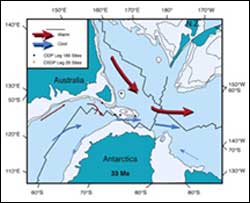
A longstanding theory that provides much of the basis for our understanding of climate change – that the mile-thick ice sheet covering Antarctica developed because of a shift in ocean currents millions of years ago – has been challenged by Purdue University scientists.
Though climate scientists have theorized for decades that the circulation of warm ocean currents was responsible for keeping Antarctica largely ice-free during the Eocene epoch prior to 35 million years ago, a s
There is a desert in the heart of the South Pacific. Surrounding Easter Island is the purest and bluest seawater on Earth, almost empty of the microscopic phytoplankton at the base of the marine food web. French vessel L’Atalante recently completed a research cruise through this region, its day-to-day route guided by ocean colour satellites.
Viewed from orbit, the colour of the global ocean is not constant but varies considerably. Specially built satellite sensors perceive su
Give a marine snail an easy life, and it will take its time drilling into a clam. Put it under competitive stress, and it will look for a faster route. Those changes, scarred into fossils, show that an unknown catastrophe nearly two million years ago changed the competitive balance in the Western Atlantic and the ecosystem has yet to fully recover, according to research published this week in the journal Science.
In the seagrass meadows of the Gulf of Mexico, Chicoreus and Phyllono
A team led by University of Maine scientists has reported finding a potential link between changes in solar activity and the Earth’s climate. In a paper due to be published in an upcoming volume of the Annals of Glaciology, Paul Mayewski, director of UMaine’s Climate Change Institute, and 11 colleagues from China, Australia and UMaine describe evidence from ice cores pointing to an association between the waxing and waning of zonal wind strength around Antarctica and a chemical signal
Hurricanes bring temporary relief to Florida reefs smothered by invasive seaweed
In August, Harbor Branch scientists began a new survey of Florida coral reefs expecting to document the devastating spread of harmful seaweed that has been progressing now for several years, but hurricane havoc has instead led the team to a surprising find. With their first survey nearly completed, it appears all reefs in the path of hurricanes Frances and Jeanne have been largely scoured free of
Europe’s coastlines are exposed to risk of pollution. I-MARQ’s prototype Geographical Information System (GIS) delivers detailed information on coastal water quality, helping decision makers shore up defences by taking appropriate action against contamination.
A recent Communication from the European Commission highlights some of the issues the IST-funded i-MARQ project aims to solve: “Our coastal zones are facing serious problems of habitat destruction, water contamination, coast